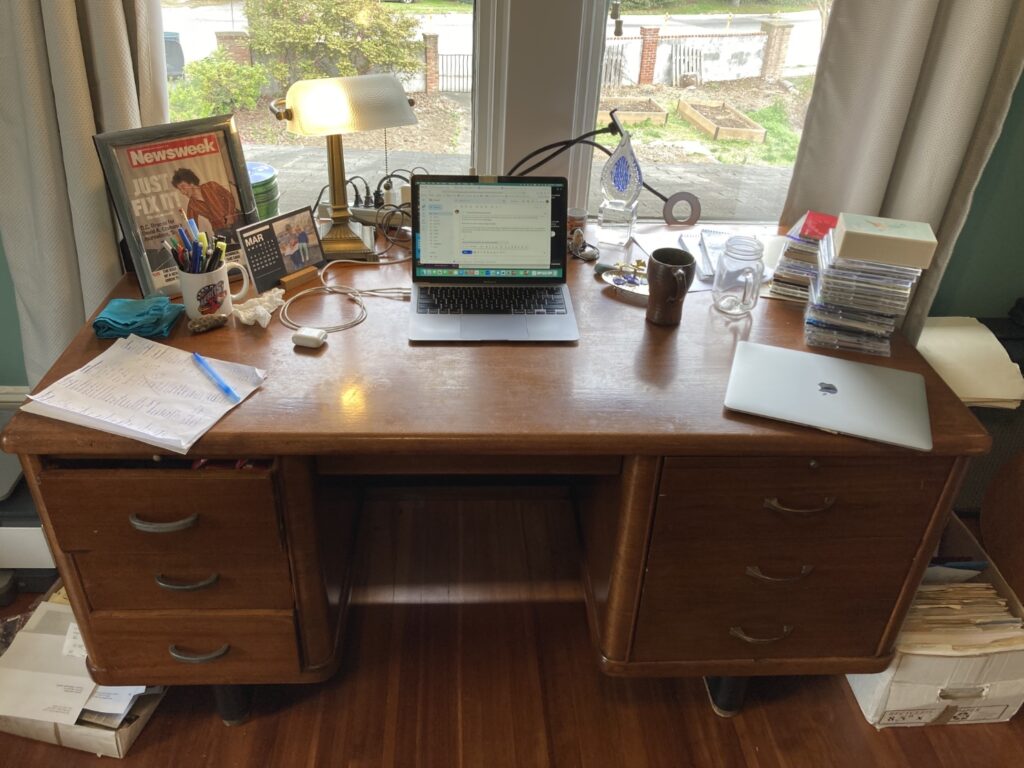David A. Graham is a journalist based in Durham, North Carolina. He is a staff writer at The Atlantic, where he covers politics, criminal justice, music, and other topics.
His coverage of the 2020 presidential election won the 2021 Toner Prize for Excellence National Political Reporting. He was previously editor of The Atlantic’s politics section, which won a Webby Award under his leadership. Graham previously reported for Newsweek and The Daily Beast, The Wall Street Journal, and The National in Abu Dhabi. His writing has appeared in Our State and the Berlin Policy Journal.
Graham has taught at the DeWitt Wallace Center for Media and Democracy at Duke University, his alma mater. When he’s not writing and teaching, he spends his time chasing after his children and listening to and making music. He is a proud member of the NewsGuild.
Looking for inspiration to help you achieve your writing goals? Subscribe to our newsletter for exclusive insights into the routines, habits, and techniques of some of the most celebrated authors in history.
Hi David, welcome to Famous Writing Routines, great to have you here with us today! As a journalist who covers a wide range of topics, from politics to music, what is your process for choosing which stories to pursue?
For most of my career, the news cycle has been one of my assignment editors. I’ve always worked in roles where I did a lot of work reacting to events and trying to contextualize or move stories forward. That has advantages and disadvantages—it’s forced me to be disciplined and effective about time, to learn to frame stories quickly, and it means I always have something to write about, but it also can be a grind; as for many reporters, covering the Trump presidency felt like an important vocation but was utterly exhausting.
I try to choose stories where I think I have something novel or unusual to add, and I like to bring history or a different angle of approach when I do. I’m always working to find ways to mix in longer-term enterprise pieces, related to both politics and my personal fascinations, like jazz and ships, into my story list. Striking the right balance is a work in progress.
You won the 2021 Toner Prize for Excellence in National Political Reporting for your coverage of the 2020 presidential election. What did that recognition mean to you, and how has it impacted your work?
I was and still am a little shocked, and I keep waiting for someone to tell me they made a tabulation error, especially given how much great coverage of the 2020 race there was. Many of the earlier winners of the Toner—people like Molly Ball, Jason Zengerle, and Karen Tumulty—are the kinds of journalists I want to be when I grow up, so for the judges to put my work in the same vicinity as theirs was very gratifying, and a sign that I’m at least on the right path. I’m not sure how it’s affected my work except as a confidence boost when I’m feeling uninspired or ineffective.
Your reporting on the 2020 presidential election was particularly focused on undecided voters in swing states and election integrity. What drew you to these topics, and how did you approach covering them?
A lot of that was a lucky chance. I live in North Carolina, which is both a crucial swing state and has been the site of endless wars over voting systems and districts for as long as I’ve been here. Being away from D.C. or New York gives me awareness of and access to a story sometimes before the rest of the national press corps notices. The nuts and bolts of voting laws and procedures are a thing that I’ve been obsessed with for years and then it just happened to become a crucial topic in 2020—fortuitous for me, though not really for the country.
What do you think is the role of journalists in covering elections and ensuring that the public has accurate information? How did you balance the need to be accurate with the need to be timely in your reporting?
Sometimes we overemphasize the timeliness. As one expert pointed out to me, there’s no such thing as official election results on Election Day. Deadlines often come before clarity, and earlier in my career, I might retreat to authoritative vagueness, but now I try to just be blunt about what I don’t know or what isn’t knowable yet.
Over the years, you’ve reported for a variety of news outlets, from Newsweek and The Wall Street Journal to The National in Abu Dhabi. How has your journalism changed over time, and what lessons have you learned along the way?
I hope my work is getting better! During that time, I’ve covered a bunch of things—general business, real estate, general assignment news, and a lot of politics—so I’ve learned a lot of stuff. That makes me a better journalist, though sometimes I worry it also makes me more cautious or timid than I was when I didn’t know what I was doing or talking about.
As a writer, I think my ability to write sentences and to structure stories has improved a great deal. I never really set out to be a magazine writer, and I’m not sure I really am one yet, but I hope someday I will be. I’ve learned (sometimes through unpleasant lessons) when to trust my instincts, as well as when to ignore them.
Do you struggle to stay focused while writing? You’re not alone! That’s why Famous Writing Routines recommends Freedom – the ultimate app and website blocker for Mac, Windows, Android, iOS, and Chrome. With over 2.5 million users, Freedom helps writers stay on task and avoid distractions. Get started for free today and reclaim your productivity!
In addition to your writing, you’ve also taught at the DeWitt Wallace Center for Media and Democracy at Duke University. What do you hope to instill in the next generation of journalists, and how do you see the field evolving in the years to come?
One thing I like about teaching at Duke is that it’s not a journalism school, so many of my students are interested in media but not going to pursue a career in it. I love the opportunity to give them a sense of how the press actually works and to teach them how to critically consume journalism. For the students who are interested in writing careers, I hope to introduce them to my favorite writers, give them a realistic view of the challenges of being in the business, and also to convey how exciting and fun it is.
One important lesson I try to impart is that if you can’t report and tell stories, you won’t get very far. You can learn anything else on the job. When I was a student, everyone said aspiring journalists needed to be able to shoot video, edit photos, and code websites to get a job. I seldom do any of those things, but I have to report and write every day.
Can you tell us about your writing routine? What does a typical day look like for you?
I don’t know that I have a particularly consistent routine these days. During much of the Trump presidency, I could get up in the morning, look at Twitter, and have a sense of what I’d be writing about (or writing first) that day. In short, I start the day by reading a lot—newspapers, newsletters, emails, and my RSS feeds, which they’ll pry from my cold, dead hands.
By the time I finish that, I sometimes have an idea or my editors do. If not, I’ll get to work on longer-term stories, and just sort of alternate between chipping away at those (making calls, doing background reading, writing) and checking the news all day. I’m also usually listening to music—I try to keep abreast of scores of new jazz records as well as other genres.
I have colleagues who work best at odd hours, but I’ve always tried to treat this as a somewhat blue-collar job: Although I sometimes have to crash stories or track news late at night, I mostly try to keep my work to working hours, even if it means my day has to be really focused to allow that.
If you could have a conversation with any author throughout history about their writing routine and creative process, who would that person be?
It’s hard to choose just one, but perhaps my fellow Ohioan Ambrose Bierce, whose ability to jump between genres has always impressed me, whose humor tickles me, and whose sardonic eye on politics inspires me. I suspect he’d either be a rollicking good hang or else cantankerous and evasive, but it’d make a good story either way. (And I’d like to ask what happened in Mexico, too.)
I’d love to know about the books you’re reading at the moment. What have been some of your favorite recent reads?
I just finished Patti Smith’s Just Kids, which I picked up from a promo pile when it was published but didn’t get around to reading until now. I shouldn’t have waited! Also in the memoir vein, I loved Kathryn Schulz’s Lost & Found, which is built in part on her essay on loss, one of my favorite pieces of journalism ever. Amiri Baraka’s Black Music, which shows how superficial and dull so much music writing is by contrast. But my recent favorite is probably John McPhee’s Uncommon Carriers, which makes the crucial but dull-seeming infrastructure that underpins modern life riveting.
What does your current writing workspace look like?
I’ve got a big, old wooden desk I got at a thrift store for cheap. It’s about the size and weight of an aircraft carrier, and I’ve now relocated it three times, much to the chagrin of the movers. From my window, I can see out to a street where there are frequent near-fender benders, for distraction value.

Affiliate disclaimer: Some links on this website are affiliate links. We may earn a small commission if you make a purchase through these links, but only promote products we truly believe in. We disclose affiliate links and give honest reviews.



1 Comment
Ambrose
March 16, 2023 at 01:18Let’s choll, Davey.